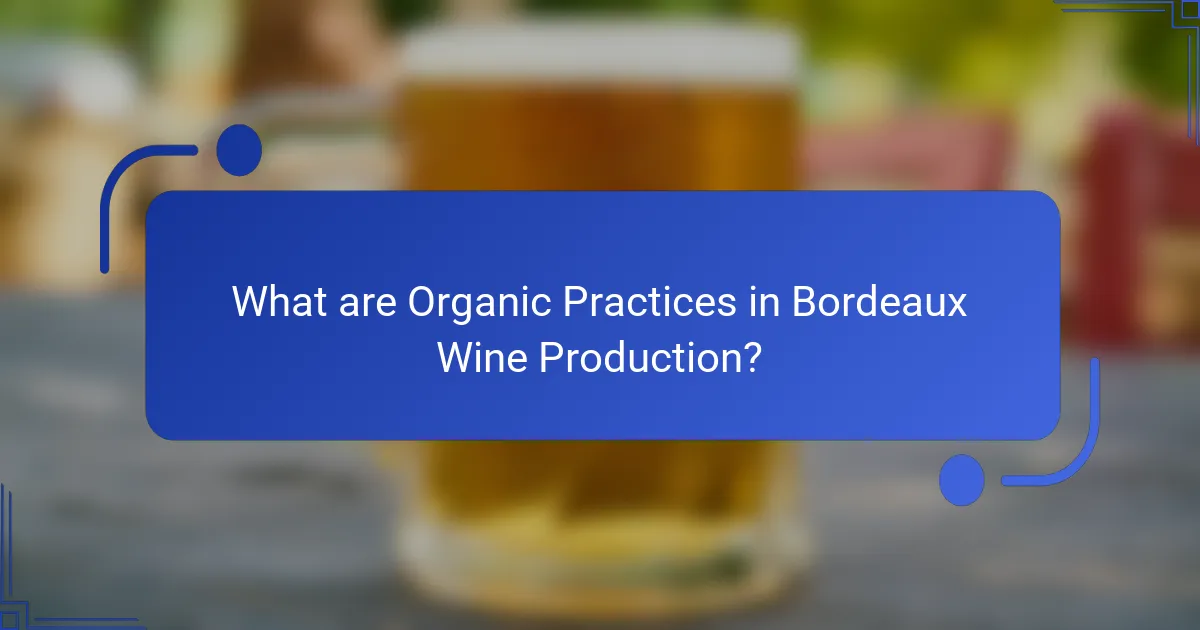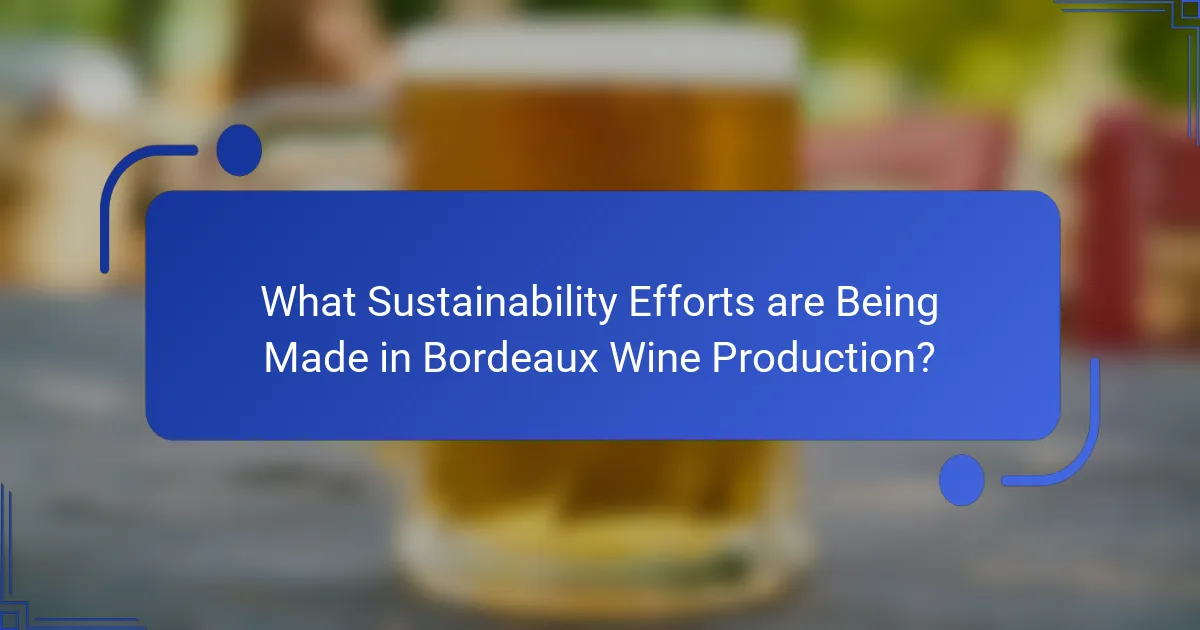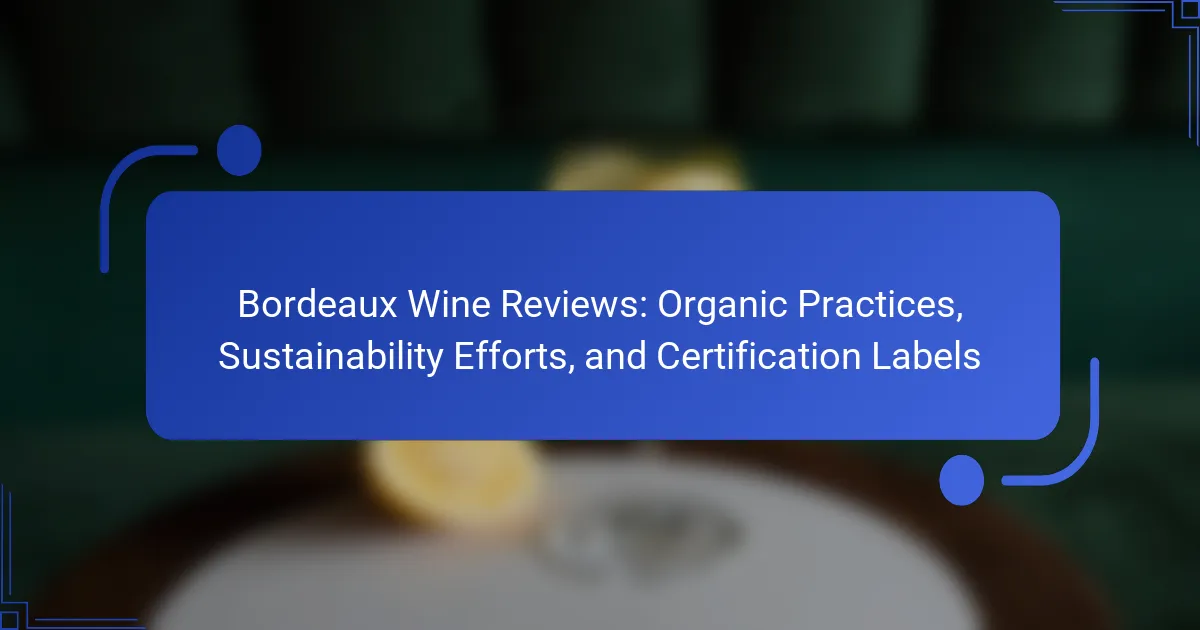
What are Bordeaux Wines and Their Distinct Characteristics?
Bordeaux wines are wines produced in the Bordeaux region of France. This region is renowned for its diverse climate and terroir, which influence the wines’ characteristics. Bordeaux wines primarily consist of red, white, and rosé varieties. The main grape varieties used in red Bordeaux wines include Cabernet Sauvignon, Merlot, and Cabernet Franc. White Bordeaux wines typically feature Sauvignon Blanc, Sémillon, and Muscadelle grapes.
Distinct characteristics of Bordeaux wines include their complexity and aging potential. Red Bordeaux wines often exhibit flavors of dark fruits, oak, and earthy notes. The tannins in these wines contribute to their structure and longevity. White Bordeaux wines are known for their crisp acidity and citrus or stone fruit flavors.
The Bordeaux region is divided into several sub-regions, each producing wines with unique profiles. The Left Bank is famous for its Cabernet Sauvignon-dominant blends, while the Right Bank is known for its Merlot-based wines. Bordeaux wines are often classified into various quality tiers, including Grand Cru and Premier Cru, which denote exceptional quality and aging potential.
How are Bordeaux Wines classified?
Bordeaux wines are classified primarily into five categories: AOC (Appellation d’Origine Contrôlée), Bordeaux Supérieur, Crémant de Bordeaux, Bordeaux Rosé, and the specific classifications of the Médoc and Graves regions. AOC wines adhere to strict regulations regarding grape varieties, production methods, and geographic boundaries. Bordeaux Supérieur wines offer slightly higher quality standards than basic AOC wines. Crémant de Bordeaux refers to sparkling wines made in the traditional method. Bordeaux Rosé wines are produced from red grape varieties and have a shorter maceration period. The Médoc and Graves regions have their own classification systems, including the renowned 1855 Classification, which ranks wines from these areas based on quality and reputation. This classification system has been in place since the mid-19th century and is still widely recognized today.
What are the primary grape varieties used in Bordeaux Wines?
The primary grape varieties used in Bordeaux wines are Cabernet Sauvignon, Merlot, and Cabernet Franc. These varieties dominate the region’s red wine production. Cabernet Sauvignon is known for its structure and aging potential. Merlot offers softness and fruitiness, making it widely popular. Cabernet Franc adds aromatic complexity and finesse. Other notable varieties include Petit Verdot and Malbec, though they are less common. Bordeaux’s unique terroir influences the characteristics of these grapes. The blend of these varieties creates the complexity and balance that Bordeaux wines are renowned for.
How does the terroir influence Bordeaux Wines?
Terroir significantly influences Bordeaux wines by shaping their unique characteristics. Terroir encompasses the soil, climate, and topography of the vineyard. The diverse soils in Bordeaux, such as gravel, clay, and limestone, affect drainage and nutrient availability. Climate plays a crucial role in grape ripening and flavor development. Bordeaux’s maritime climate provides mild winters and warm summers, ideal for grape growth. Additionally, the region’s varied topography creates microclimates that can lead to different flavor profiles in wines. For instance, wines from the left bank are often more tannic due to gravel soils, while those from the right bank may be softer with clay-rich soils. Ultimately, terroir contributes to the complexity and distinctiveness of Bordeaux wines, making them highly regarded worldwide.
Why are Bordeaux Wines significant in the wine industry?
Bordeaux wines are significant in the wine industry due to their historical prestige and global influence. They are among the most recognized and sought-after wines worldwide. Bordeaux is known for its unique terroir, which contributes to the complexity of its wines. The region produces a variety of wine styles, primarily red, white, and sweet wines. Bordeaux wines have set standards for quality and classification, such as the 1855 Classification. This classification established a hierarchy of growths that influence pricing and reputation. Bordeaux also plays a key role in wine education and tourism, attracting millions of visitors annually. The region’s commitment to sustainability and organic practices further enhances its significance in contemporary wine production.
What historical factors contributed to the fame of Bordeaux Wines?
Bordeaux wines gained fame due to several historical factors. The region’s winemaking dates back to Roman times, establishing a long tradition. In the 12th century, marriage alliances with England boosted Bordeaux’s wine trade. The 1855 classification ranked Bordeaux wines, enhancing their prestige. The introduction of phylloxera in the late 19th century led to innovations in vineyard practices. Bordeaux’s geographical advantages, including its climate and soil, contribute to high-quality grapes. The establishment of the Bordeaux Wine Council in 1948 further promoted the region’s wines. These factors combined to solidify Bordeaux’s reputation as a premier wine-producing area.
How do Bordeaux Wines compare to other wine regions?
Bordeaux wines are renowned for their complexity and aging potential, often compared favorably to wines from regions like Napa Valley and Tuscany. Bordeaux’s unique terroir, characterized by diverse soils and a maritime climate, contributes to its distinctive flavor profiles. The region primarily focuses on blends, utilizing grape varieties such as Merlot, Cabernet Sauvignon, and Cabernet Franc. In contrast, Napa Valley emphasizes single varietals, particularly Cabernet Sauvignon. Bordeaux wines typically exhibit more earthiness and structure, while wines from Napa tend to be fruit-forward and opulent. Additionally, Bordeaux has a long history of winemaking, dating back to Roman times, which adds to its prestige. The classification system in Bordeaux, established in 1855, further distinguishes its wines based on quality, unlike many other regions. This has established Bordeaux as a benchmark for wine quality globally.

What are Organic Practices in Bordeaux Wine Production?
Organic practices in Bordeaux wine production involve methods that prioritize environmental sustainability. These practices include using organic fertilizers and natural pest control methods. Bordeaux vineyards often avoid synthetic chemicals and genetically modified organisms. Additionally, organic farming enhances soil health and biodiversity. Certification bodies, like Ecocert, ensure compliance with organic standards. According to the French Ministry of Agriculture, organic vineyards in Bordeaux have increased significantly in recent years. This shift reflects a growing consumer demand for sustainable wine options.
How is organic farming defined in the context of Bordeaux Wines?
Organic farming in the context of Bordeaux Wines is defined as a method of viticulture that avoids synthetic fertilizers and pesticides. This approach emphasizes the use of natural substances and processes to enhance soil health and biodiversity. Bordeaux’s organic practices focus on maintaining ecological balance within vineyards. Farmers adhere to specific regulations set by organic certification bodies. These regulations include crop rotation, cover cropping, and the use of organic fertilizers. The goal is to produce high-quality wines while minimizing environmental impact. Bordeaux’s commitment to organic farming reflects a broader trend towards sustainability in the wine industry. This commitment is evidenced by the increasing number of certified organic vineyards in the region.
What specific organic practices are employed by Bordeaux winemakers?
Bordeaux winemakers employ several specific organic practices. They use organic fertilizers such as compost and green manure. Bordeaux vineyards often implement crop rotation to maintain soil health. They practice integrated pest management to control pests without synthetic chemicals. Cover crops are grown to enhance biodiversity and prevent erosion. Bordeaux winemakers also focus on manual harvesting to minimize damage to grapes. Many adhere to organic certification standards set by organizations like Ecocert. These practices contribute to sustainable viticulture and high-quality wine production.
How do organic practices affect the taste and quality of Bordeaux Wines?
Organic practices enhance the taste and quality of Bordeaux wines by promoting healthier vines and soil. These methods reduce chemical inputs, fostering biodiversity in vineyards. Healthier vines produce grapes with more complex flavors. Additionally, organic farming enhances soil quality, which contributes to the overall terroir. Research indicates that organic wines often display greater aromatic intensity and depth. A study published in the Journal of Agricultural and Food Chemistry found that organic grapes have higher levels of phenolic compounds. These compounds are linked to improved flavor and aging potential. Therefore, organic practices significantly influence the taste and quality of Bordeaux wines.
Why is organic certification important for Bordeaux Wines?
Organic certification is important for Bordeaux Wines because it ensures adherence to environmentally sustainable practices. This certification signifies that the wine is produced without synthetic pesticides or fertilizers. It promotes biodiversity and soil health, which are crucial for grape quality. Additionally, organic certification enhances consumer trust and marketability. Studies show that organic wines often command higher prices due to perceived quality and ethical production methods. In Bordeaux, where terroir is vital, organic practices can improve the unique characteristics of the wine. Thus, organic certification supports both environmental sustainability and economic viability for producers.
What are the benefits of organic certification for consumers?
Organic certification ensures that products meet specific agricultural standards. Consumers benefit from higher food quality and safety. Organic products typically contain fewer pesticides and harmful chemicals. This reduces health risks associated with chemical exposure. Additionally, organic certification promotes environmentally sustainable farming practices. Such practices help preserve soil health and biodiversity. Consumers also support local economies by choosing certified organic products. Research shows that organic farming can lead to improved nutritional quality in food. These benefits make organic certification valuable for consumers seeking healthier and more sustainable options.
How does organic certification impact marketability for Bordeaux Wines?
Organic certification enhances the marketability of Bordeaux wines. It appeals to consumers who prioritize sustainability and health. Certified organic wines often command higher prices. This is due to growing demand for organic products in the wine market. In 2021, organic wine sales in France increased by 20%. Bordeaux, as a prestigious wine region, benefits from this trend. Organic certification also builds consumer trust in product quality. It differentiates Bordeaux wines in a competitive market.

What Sustainability Efforts are Being Made in Bordeaux Wine Production?
Bordeaux wine production is increasingly focused on sustainability efforts. Many vineyards are adopting organic farming practices. This includes reducing chemical pesticides and fertilizers. Biodynamic methods are also being implemented. These practices enhance soil health and biodiversity. The Bordeaux Wine Council promotes sustainable viticulture through its “Vignobles et Découvertes” certification. This initiative encourages eco-friendly practices among producers. Additionally, many wineries are investing in renewable energy sources. These efforts aim to reduce carbon footprints and promote environmental stewardship.
How do Bordeaux wineries implement sustainable practices?
Bordeaux wineries implement sustainable practices through various methods. These include organic farming, biodynamic viticulture, and integrated pest management. Organic farming eliminates synthetic pesticides and fertilizers. Biodynamic practices involve holistic approaches, such as planting according to lunar cycles. Integrated pest management uses natural predators to control pests. Many Bordeaux wineries also focus on water conservation techniques. They utilize rainwater harvesting and efficient irrigation systems. Additionally, some wineries are investing in renewable energy sources. Solar panels and wind turbines are being installed to reduce carbon footprints. These practices contribute to the overall sustainability of the Bordeaux wine industry.
What specific sustainability initiatives are common in Bordeaux?
Bordeaux is known for various sustainability initiatives aimed at preserving the environment. Many vineyards in the region adopt organic farming practices. These practices reduce chemical inputs and promote biodiversity. Additionally, some wineries implement integrated pest management strategies. This method minimizes pesticide use and enhances ecosystem health. Water conservation techniques are also common, including drip irrigation systems. These systems optimize water usage and reduce waste. Furthermore, Bordeaux has seen the rise of certifications like HVE (High Environmental Value). This certification recognizes vineyards that meet strict environmental standards. These initiatives collectively contribute to sustainable wine production in Bordeaux.
How do these initiatives address environmental concerns?
These initiatives address environmental concerns by promoting sustainable agricultural practices. They reduce chemical pesticide and fertilizer usage, minimizing soil and water pollution. Additionally, they enhance biodiversity by encouraging organic farming methods. This leads to healthier ecosystems and supports local wildlife. Certification labels ensure transparency and accountability in sustainable practices. Studies show that organic vineyards can improve soil health and reduce carbon emissions. For example, the use of cover crops in Bordeaux vineyards has been linked to increased soil fertility and reduced erosion. Overall, these initiatives contribute to environmental preservation and promote long-term sustainability in the wine industry.
Why is sustainability crucial for the future of Bordeaux Wines?
Sustainability is crucial for the future of Bordeaux wines because it ensures environmental protection and economic viability. Bordeaux vineyards face challenges such as climate change and resource depletion. Sustainable practices help mitigate these issues by promoting biodiversity and reducing carbon footprints. For instance, organic farming methods enhance soil health and water conservation. Additionally, consumer demand for sustainable products is rising, influencing market trends. In 2020, 40% of Bordeaux wine producers reported implementing sustainability initiatives. This shift not only protects the region’s heritage but also secures its future in a competitive global market.
What are the long-term benefits of sustainable practices for winemakers?
Sustainable practices for winemakers yield long-term benefits such as improved soil health, enhanced biodiversity, and increased resilience to climate change. Implementing organic farming techniques leads to healthier vines and higher quality grapes. This results in better wine flavors and aromas. Sustainable practices also reduce chemical inputs, which can lower production costs over time. Additionally, winemakers can attract environmentally conscious consumers, boosting sales and brand loyalty. Research shows that vineyards employing sustainable practices see a 20% increase in yield over five years. These benefits contribute to the overall sustainability of the wine industry.
How does consumer demand influence sustainability in Bordeaux Wines?
Consumer demand significantly influences sustainability in Bordeaux wines by driving producers to adopt eco-friendly practices. As consumers increasingly prioritize sustainable products, Bordeaux wineries respond by implementing organic farming techniques. This includes reducing chemical inputs and enhancing biodiversity in vineyards. The demand for transparency also encourages wineries to obtain certifications like organic or biodynamic. Such certifications attract environmentally conscious consumers, creating a competitive advantage. Additionally, market trends show that sustainable wines often command higher prices, incentivizing producers to invest in sustainable practices. Research indicates that sales of organic wines have grown significantly, reflecting changing consumer preferences. Thus, consumer demand directly shapes sustainability efforts in Bordeaux wines.

What Certification Labels are Associated with Bordeaux Wines?
Bordeaux wines are associated with several certification labels. The most notable labels include AOC (Appellation d’Origine Contrôlée) and AOP (Appellation d’Origine Protégée). These certifications ensure quality and authenticity based on specific geographic regions. Bordeaux wines may also carry organic certifications, such as AB (Agriculture Biologique) and Ecocert. These labels confirm adherence to organic farming practices. Additionally, some Bordeaux producers may obtain certifications for sustainability, like HVE (Haute Valeur Environnementale). This label indicates a commitment to environmental protection and biodiversity.
What are the main certification labels for organic and sustainable Bordeaux Wines?
The main certification labels for organic and sustainable Bordeaux wines are AB (Agriculture Biologique), Demeter, and HVE (Haute Valeur Environnementale). AB is the official French organic certification, ensuring compliance with EU organic farming regulations. Demeter certifies biodynamic practices, emphasizing holistic and ecological approaches to agriculture. HVE focuses on high environmental value, promoting sustainable practices in viticulture. These certifications guarantee that Bordeaux wines meet specific organic and sustainability standards.
What do these certification labels signify for consumers?
Certification labels signify that a product meets specific standards for quality, sustainability, or organic practices. For consumers, these labels provide assurance about the product’s sourcing and production methods. For example, organic certification indicates that the wine is produced without synthetic pesticides or fertilizers. Additionally, sustainability labels may signify environmentally friendly practices in vineyard management. Certification can also reflect adherence to ethical labor practices. Consumers often rely on these labels to make informed purchasing decisions. Research shows that 70% of consumers are willing to pay more for certified products. Thus, certification labels enhance consumer trust and transparency in the Bordeaux wine market.
How do certification processes differ among various labels?
Certification processes differ among various labels based on specific criteria and requirements. Each certification label, such as organic, biodynamic, or sustainable, has distinct standards. For instance, organic certification often requires the absence of synthetic pesticides and fertilizers. Biodynamic certification includes additional practices like lunar planting cycles and soil health. Sustainable labels may focus on environmental impact and resource management rather than strictly organic practices. The certification process can also vary in terms of the duration and frequency of inspections. Some labels require annual reviews, while others may have longer intervals. Furthermore, the governing bodies for each certification may have different protocols and documentation requirements. These differences influence the overall credibility and market perception of the wines produced under each label.
Why should consumers pay attention to certification labels on Bordeaux Wines?
Consumers should pay attention to certification labels on Bordeaux wines because these labels indicate quality and authenticity. Certification labels such as AOC (Appellation d’Origine Contrôlée) ensure that the wine meets specific standards for production. These standards include geographical origin, grape variety, and winemaking practices. Additionally, organic and biodynamic certifications reflect sustainable farming practices. Such practices can enhance the wine’s flavor and environmental impact. Studies show that wines with certification labels often have higher consumer trust and perceived value. Thus, certification labels serve as a reliable guide for consumers seeking quality Bordeaux wines.
What role do certification labels play in purchasing decisions?
Certification labels significantly influence purchasing decisions. They provide consumers with assurance about product quality and adherence to specific standards. For instance, organic certification indicates that the product meets established agricultural practices. Research shows that 70% of consumers are more likely to buy products with recognized certification labels. These labels also enhance brand trust and credibility. In the context of Bordeaux wines, certification labels can indicate sustainable practices. This transparency helps consumers make informed choices aligned with their values.
How can consumers verify the authenticity of certification labels?
Consumers can verify the authenticity of certification labels by checking for recognized certification bodies. These bodies typically have official websites listing certified products and producers. Consumers should look for specific logos or seals that correspond to these organizations. They can also verify the label’s claims by contacting the certifying organization directly. Additionally, researching the product’s origin and production practices can provide further assurance. Many reputable brands also provide transparency through detailed information on their websites. This approach ensures that consumers make informed choices based on verified certifications.
What are the best practices for selecting Bordeaux Wines based on organic and sustainability efforts?
Select Bordeaux wines by checking for organic certification labels. Look for labels such as “AB” (Agriculture Biologique) or “EU Organic.” These indicate compliance with organic farming practices. Assess the winery’s sustainability efforts. Many Bordeaux producers implement eco-friendly practices, such as water conservation and biodiversity initiatives. Research the winery’s commitment to sustainable viticulture. Some wineries publish sustainability reports detailing their practices and goals. Consider purchasing from estates known for transparency in their organic and sustainability efforts. This information can often be found on their websites or through wine reviews.
Bordeaux wines are renowned for their distinct characteristics, produced in the Bordeaux region of France, with primary grape varieties including Cabernet Sauvignon, Merlot, and Sauvignon Blanc. This article explores the complexity and aging potential of Bordeaux wines, their classification systems, and the significant influence of terroir on flavor profiles. It also delves into the region’s commitment to organic practices and sustainability efforts, highlighting certification labels such as AOC and AB that ensure quality and environmentally friendly production methods. Readers will gain insights into how these factors contribute to the marketability and consumer perception of Bordeaux wines.
